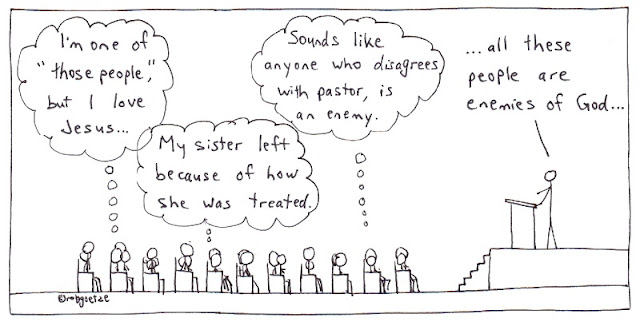From reactive to proactive. Where does your church land on this scale? When it comes to controversial matters like abortion, euthanasia, homosexuality, and hell, many tend to be reactive, which means most of the time they ignore such matters. And then when there’s a pressing reason like proposed changes to legislation, an adult club renting the building next door, or a Rob Bell asking questions about heaven and hell, they marshal their resources, preach sermons, picket and boycott, and tweet tweets which they sometimes later regret.
A current example of this is the response churches are giving to the legalization of same-sex marriage in the U.S. or the granting of same-sex blessings in Canada, where gay marriage is already legal.
Take my church, for example.
At its recent meeting, our diocese held a vote to allow the bishop to give permission to priests who want to provide a blessing to same-sex couples who are in civil marriages. To say it another way, if a legally married same-sex couple asks the priest to give them a blessing, the priest must first ask for the bishop’s permission. Note that this resolution does not oblige any priests to provide such blessings; it simply gives the bishop permission to say “yes” if a priest asks. Now, the church we attend officially has a conservative view on marriage and was not pleased that the vote passed, in fact by a significant margin. In response to this, the leadership discussed the matter at the church’s semi-annual meeting, and will have a task group consider what response to make.
They also discussed it with the youth. And when our children came home from a youth day, one of them expressed that they didn’t know why the church was making such a big deal about blessing people who love each other when there’s more important things like KONY2012 happening in the world.
Some people might suggest that the leadership needs to do a better job of explaining how this really is a significant issue, and that the church should have been proactive in teaching its beliefs more clearly before a resolution like this one came up.
I would suggest that there’s a bigger picture that’s being missed here. And while it involves being proactive, it’s not about clarifying “what’s right and what’s wrong” before it becomes critical. It’s about perspective, respect for others, and God’s heart for people.
Here are four things that I wish pastors and others in church leadership were teaching, with some recommendations for each point:
1. The reality that God loves gay and lesbian people
Of course we are told in church that God loves everyone. When said generally like this, it is easier to forget this reality when we encounter people we don’t like or who are different from us. But when it is said with a specific people group in mind, it has more impact and is harder to ignore.
- State clearly that God loves lesbian, gay, bisexual and transgender (LGBT) people. Repeat on a regular basis.
- Affirm that Jesus gave his life for gay people and straight people and transgender people and everyone else.
- Emphasize that loving our neighbours includes loving LGBT neighbours, relatives, and colleagues. Give a similar emphasis to other particular neighbours depending on current events, your city or neighbourhood, etc. For example, emphasizing God’s love for Muslim neighbours would be particularly helpful after 9/11. The goal is not to single out a people group, but to emphasize God’s love for people whom we might find it easier to ignore or hate.
Related to this is the concept that the self of the other person matters more than my truth. As Miroslav Volf says, “I may not sacrifice the other at the altar of my truth. Jesus, who claimed to be the Truth, refused to use violence to ‘persuade’ those who did not recognize his truth.” (Exclusion and Embrace, page 272).



















